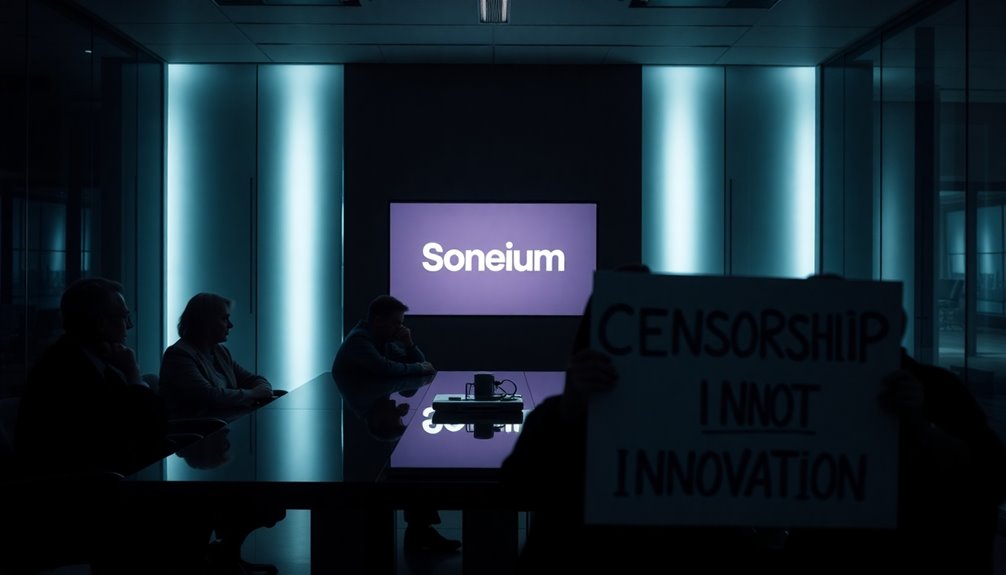Sony's Soneium blockchain is facing significant backlash due to allegations of censorship. Users are upset about blacklisted memecoins, which many see as a violation of Web3 principles. This blacklisting has resulted in access issues and financial losses, exceeding $100,000 for some. Critics accuse Sony of prioritizing corporate interests over investor rights, leading to accusations of "rugging" investors. The community's mixed reactions highlight a struggle between innovation and the protection of investor interests. If you wish to uncover more details about the situation and its implications, there's plenty more to explore.
Key Takeaways
- Sony's Soneium blockchain has faced backlash for blacklisting memecoins, raising concerns about censorship and centralization.
- Users reported financial losses exceeding $100,000 due to access issues with blacklisted tokens, leading to accusations of corporate prioritization.
- Approximately $3.8 million in market value was lost after Soneium's freezing actions, fueling claims of "rugging" investors.
- Community reactions are divided, with some highlighting innovation while others criticize the contradiction of Web3 principles.
- The blacklisting policies have sparked debates on regulatory compliance versus the fundamental decentralized nature of blockchain technology.
Sony's Controversial Blockchain Decisions

As Sony rolls out its blockchain platform, Soneium, many are questioning the company's controversial decisions that seem to clash with the core principles of decentralization.
The platform's blacklisting policy, targeting tokens associated with memecoins and IP violations, raises eyebrows. Critics argue this approach undermines the permissionless nature of blockchain, while developers like Robert Sasu highlight that centralization shouldn't be a hallmark of decentralized ledgers. Notably, this policy has led to significant backlash, as users reported 403 Forbidden errors when attempting to access blacklisted tokens.
Although Soneium boasts high scalability and seamless integration with Sony's ecosystem, its approach to IP protection has led to significant user financial losses, with some losing over $100,000.
This centralization means Sony retains the power to freeze tokens at will, fueling concerns about transparency and governance in an industry that thrives on decentralization.
Censorship Allegations Spark Outcry

Censorship allegations against Sony's blockchain platform, Soneium, have ignited a fierce backlash from the community.
Users are particularly upset about the blacklisting of memecoins like Aibo and Toro, which resulted in significant losses for investors. Many accused Soneium of "rugging" them, fearing that the platform's actions prioritize corporate interests over decentralization. Critics argue that Soneium's restrictions on intellectual property use contradict the core principles of Web3, sparking heated debates among users. While some appreciate Soneium's innovative approach, others are concerned about the impact on their holdings and the platform's future. Additionally, the freezing actions led to a loss of approximately $3.8 million in combined market value for the affected tokens, heightening investor frustration. Despite the backlash, Soneium's team defends their policies, claiming they're committed to protecting creators' rights while aiming to maintain a decentralized environment.
Cryptocurrency Market Volatility

While the cryptocurrency market offers exciting opportunities, its volatility can be intimidating for investors. Market sentiment plays an essential role; positive news can send prices soaring, while negative headlines often trigger sharp declines. Predictions for Bitcoin trading ranges indicate that Bitcoin's price could fluctuate between US$180,000 and US$190,000 in 2025, reflecting the ongoing market dynamics.
You might find yourself caught in emotional trading, where fear and greed amplify price swings. Additionally, the balance of supply and demand greatly impacts price movements. With Bitcoin's limited supply, rising demand can lead to higher prices, but oversupply can do the opposite.
Regulatory changes can also create sudden market shifts, affecting liquidity and investor confidence. Finally, technological advancements and security breaches can lead to panic that drives prices down. Staying informed about these factors is vital for maneuvering this unpredictable landscape.
Corporate Blockchain Partnerships Expand

With the increasing demand for blockchain technology, companies are forming strategic partnerships to enhance their capabilities and streamline operations.
For instance, Boerse Stuttgart Digital and Fenergo have teamed up to improve compliance for financial institutions entering the cryptocurrency space, ensuring faster onboarding while adhering to KYC and AML regulations.
Similarly, Swift, UBS, and Chainlink completed a pilot project to settle tokenized fund transactions, showcasing blockchain's potential to increase efficiency and transparency. Notably, Soneium's launch on January 14, 2025, exemplifies how major corporations are venturing into the blockchain space.
Additionally, Commercial Bank International and Zumo are investigating digital asset sustainability, merging financial expertise with blockchain tech.
These collaborations not only bolster regulatory compliance but also pave the way for global adoption, scalability, and security in the ever-evolving digital asset landscape.
Regulatory Scrutiny on Blockchain Initiatives

As governments ramp up their efforts to regulate the blockchain landscape, businesses in the sector face increasing scrutiny over compliance and consumer protections. You're likely to notice stricter Know Your Customer (KYC) and Anti-Money Laundering (AML) requirements aimed at preventing fraud and scams. International standards are becoming the norm for crypto exchanges, ensuring a safer environment for users. Tax policies are evolving too, with clearer guidelines for reporting crypto earnings to avoid penalties. Additionally, stablecoins are under the spotlight, requiring transparency about reserves to maintain financial stability. Regulatory frameworks are expected to vary significantly across countries, influencing how businesses adapt to these changes. As these regulations tighten, understanding their implications is essential for you to navigate the evolving blockchain market successfully.
Long-term Blockchain Viability Concerns

The evolving regulatory landscape for blockchain technologies raises questions about their long-term viability. You might find that scalability challenges, technological advancements, and global adoption trends greatly impact the future of blockchain.
- Limited transaction throughput makes it tough for networks to compete with traditional systems.
- High transaction fees deter everyday users from participating.
- Energy consumption concerns can muddy the perception of blockchain's efficiency. Additionally, the recent approval of Bitcoin Spot ETFs has broadened investor access, highlighting the ongoing evolution in the regulatory landscape.
While increasing adoption rates show promise, the need for common standards and technological breakthroughs is essential.
Without addressing these issues, blockchain's potential could remain unrealized, leaving you to wonder if it can truly transform industries in the long run.
Frequently Asked Questions
What Specific Actions Led to Allegations of Censorship by Sony?
You'll notice that specific actions like blacklisting memecoins triggered allegations of censorship.
For instance, two memecoins, Aibo and Toro, were frozen shortly after launch, causing traders to lose access to their holdings. Users accused the platform of "rugging" them, as significant funds vanished.
This swift enforcement raised concerns about the centralized control over transactions and the lack of transparency, leading to community outrage and calls for better governance to protect users' rights.
How Does Censorship Affect Users in the Soneium Ecosystem?
When the chips are down, censorship can hit you hard in the Soneium ecosystem.
You might find yourself unable to trade or access blacklisted tokens, leading to frustration and confusion.
This situation can lead to significant financial losses, with users reporting losses over $100,000 due to frozen contracts.
Plus, the lack of transparency regarding blacklisting can leave you feeling vulnerable, as your investments hang in the balance without clear recourse or support.
Are There Alternatives to Sony's Blockchain for Developers?
If you're looking for alternatives to Sony's blockchain, you've got several solid options.
Ethereum offers robust developer tools and a large community, while Binance Smart Chain provides fast, low-cost transactions.
Solana stands out for its speed, and Algorand focuses on enterprise features with secure, fast transactions.
Polkadot emphasizes interoperability, allowing your dApps to connect across multiple blockchains.
Each option has unique strengths, so choose one that aligns with your development goals!
What Are the Potential Impacts on Investors From This Backlash?
The backlash can greatly impact you as an investor.
You might face financial losses from the drastic drop in memecoin values, leading to a reassessment of your investment strategies. Increased market volatility could make you more cautious, affecting your sentiment towards similar projects.
Additionally, regulatory uncertainty may raise concerns about compliance and future developments, further complicating your investment decisions and potentially eroding your trust in the platform and its long-term viability.
How Is the Gaming Community Responding to Sony's Blockchain Decisions?
You'll notice that the gaming community is buzzing with mixed reactions to Soneium's recent blockchain decisions.
Some users are frustrated over blacklisted meme coins, claiming it limits their trading options and access to investments. Others express concerns about potential rug-pulling actions, calling for fairer treatment.
Critics argue that the platform undermines decentralization principles, while developers defend their stance on protecting intellectual property.
Conclusion
In light of the backlash over alleged censorship in Sony's Soneium blockchain, it's clear that corporate decisions can greatly impact public perception. Did you know that over 70% of blockchain users prioritize transparency and decentralization in their platforms? This statistic highlights the growing demand for integrity in the industry. As Sony navigates these challenges, the future of its blockchain initiatives will likely depend on how well it addresses these concerns and regains consumer trust.









